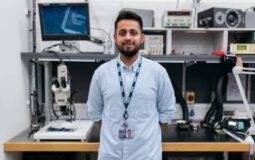Technology has become an integral part of our lives, transforming various industries and revolutionizing the way we live, work, and interact. In recent years, technology has made significant advancements in the healthcare sector, leading to improved medical treatments, enhanced patient care, and a promising future for the healthcare industry. This article explores the intersection of technology and healthcare, highlighting key developments and discussing the potential impact of technology on the future of healthcare.
Introduction
In recent years, technology has played a pivotal role in shaping the healthcare landscape. From telemedicine and electronic health records to artificial intelligence and robotics, the integration of technology in healthcare has opened up new possibilities for delivering efficient, personalized, and patient-centric care. This article delves into the various technological advancements in healthcare and their potential implications for the future.
Telemedicine: Revolutionizing Patient Care
Telemedicine, the provision of healthcare services remotely through telecommunications technology, has emerged as a game-changer in the healthcare industry. It allows healthcare professionals to diagnose and treat patients without the need for in-person visits, reducing barriers to access and improving patient outcomes. With telemedicine, patients can consult with doctors from the comfort of their homes, saving time and costs associated with travel. Additionally, telemedicine enables remote monitoring of patients’ vital signs, facilitating proactive interventions and timely healthcare interventions.
Electronic Health Records: Streamlining Data Management
The adoption of electronic health records (EHRs) has transformed the way healthcare providers manage patient information. EHRs eliminate the need for paper-based records and enable seamless sharing of patient data between healthcare professionals. With EHRs, healthcare providers can access a patient’s complete medical history, including diagnoses, medications, allergies, and lab results, leading to more accurate diagnoses and personalized treatment plans. Moreover, EHRs enhance care coordination among different healthcare providers, reducing errors and improving patient safety.
Artificial Intelligence: Augmenting Diagnostic Capabilities
Artificial intelligence (AI) has made remarkable strides in healthcare, particularly in the field of diagnostics. AI algorithms can analyze large amounts of medical data, such as imaging scans and lab results, to aid in the detection and diagnosis of diseases. These AI-powered systems can identify patterns and anomalies that may go unnoticed by human clinicians, leading to earlier detection and more precise diagnoses. AI also holds promise in predicting disease progression, optimizing treatment plans, and enabling personalized medicine.
Robotics: Enhancing Surgical Procedures
Robotic-assisted surgery has revolutionized surgical procedures by offering greater precision, flexibility, and control to surgeons. Robotic systems, controlled by skilled surgeons, can perform complex procedures with enhanced dexterity and minimal invasiveness. This technology enables smaller incisions, reduced blood loss, faster recovery times, and improved surgical outcomes. Robotics also facilitates telesurgery, allowing surgeons to operate on patients remotely, expanding access to specialized care in underserved areas.
Internet of Medical Things (IoMT): Connecting Healthcare Devices
The Internet of Medical Things (IoMT) refers to the network of medical devices and applications that are connected and share data with healthcare providers. IoMT devices, such as wearable sensors and remote monitoring devices, enable continuous collection of patient data, including vital signs, activity levels, and medication adherence. This real-time data empowers healthcare professionals to monitor patients remotely, detect early warning signs, and intervene promptly, ultimately improving patient outcomes and reducing hospital readmissions.
Wearable Technology: Promoting Personal Health Monitoring
Wearable technology, such as fitness trackers and smartwatches, has gained popularity among individuals striving to maintain a healthy lifestyle. These devices monitor various aspects of personal health, including heart rate, sleep patterns, physical activity, and calorie expenditure. By providing users with real-time feedback and insights, wearable technology encourages individuals to make positive behavioral changes and take proactive steps towards improving their overall health and well-being.
Virtual Reality: Transforming Medical Education and Training
Virtual reality (VR) technology has found applications in medical education and training, offering immersive and interactive learning experiences for healthcare professionals. VR simulations allow medical students and practitioners to practice surgical procedures, enhance their diagnostic skills, and navigate realistic medical scenarios in a risk-free environment. By facilitating hands-on training and experiential learning, VR technology can help improve the competency and confidence of healthcare professionals, ultimately benefiting patient care.
Precision Medicine: Tailoring Treatment to Individuals
Precision medicine aims to deliver targeted and personalized healthcare based on an individual’s unique genetic makeup, lifestyle, and environmental factors. Advances in genomic sequencing and analysis have paved the way for precision medicine, enabling healthcare providers to identify genetic variations associated with diseases and tailor treatments accordingly. By understanding an individual’s molecular profile, precision medicine can optimize treatment efficacy, minimize adverse effects, and improve patient outcomes.
Big Data and Analytics: Improving Healthcare Decision-making
The abundance of healthcare data, combined with powerful analytics tools, has unlocked opportunities for data-driven decision-making in healthcare. Big data analytics can mine vast amounts of patient data to identify patterns, trends, and correlations that can inform clinical decision-making, resource allocation, and population health management. By leveraging insights derived from big data, healthcare providers can optimize care delivery, predict disease outbreaks, and design targeted interventions for at-risk populations.
Blockchain: Ensuring Security and Privacy in Healthcare
Blockchain technology offers a secure and decentralized platform for storing and sharing healthcare data. By utilizing cryptographic techniques and distributed ledger technology, blockchain enhances data security, privacy, and interoperability in healthcare. Patients can have more control over their health information, granting access to healthcare providers as needed while maintaining the confidentiality of sensitive data. Blockchain also has the potential to streamline administrative processes, such as insurance claims and supply chain management, reducing inefficiencies and fraud.
Challenges and Ethical Considerations
While technology presents promising opportunities for the future of healthcare, it also brings forth various challenges and ethical considerations. Ensuring data privacy and security, addressing biases in AI algorithms, and bridging the digital divide are critical issues that need to be addressed. Healthcare professionals must navigate the ethical implications of using technology, such as maintaining the human touch in patient care and addressing the potential for automation to replace certain healthcare roles.
The Future of Healthcare: A Technological Perspective
The future of healthcare holds tremendous potential with the continued integration of technology. As advancements in AI, robotics, genomics, and data analytics continue to unfold, healthcare is poised to become more personalized, efficient, and accessible. The convergence of these technologieswill enable predictive and preventive healthcare, early disease detection, and targeted interventions. Patients will have greater control over their health, with wearable devices and IoMT enabling continuous monitoring and proactive interventions. Virtual reality and robotics will reshape surgical procedures, improving precision and patient outcomes. The use of AI in diagnostics and treatment planning will enhance accuracy and effectiveness, leading to personalized medicine.
Conclusion
Technology has paved the way for a promising future in healthcare. From telemedicine and electronic health records to AI, robotics, and precision medicine, the integration of technology is transforming the way healthcare is delivered. While challenges and ethical considerations remain, the potential benefits of technology in healthcare are vast. By leveraging the power of technology, healthcare professionals can provide more personalized, efficient, and accessible care, ultimately improving patient outcomes and shaping the future of healthcare.
FAQs
1. How does telemedicine work? Telemedicine allows patients to consult with healthcare professionals remotely using telecommunications technology. Through video calls or online platforms, patients can receive medical advice, diagnosis, and treatment without visiting a healthcare facility.
2. How do electronic health records benefit patients? Electronic health records (EHRs) streamline data management and enable seamless sharing of patient information between healthcare providers. This leads to more accurate diagnoses, personalized treatment plans, and improved care coordination among different healthcare professionals.
3. What role does artificial intelligence play in healthcare? Artificial intelligence (AI) augments diagnostic capabilities by analyzing large amounts of medical data. AI algorithms can detect patterns and anomalies that may be missed by human clinicians, leading to earlier disease detection and more precise diagnoses. AI also holds promise in treatment optimization and personalized medicine.
4. How are robotics enhancing surgical procedures? Robotic-assisted surgery offers greater precision, flexibility, and control to surgeons. Robotic systems enable minimally invasive procedures with smaller incisions, reduced blood loss, and faster recovery times. Surgeons can perform complex surgeries with enhanced dexterity, improving surgical outcomes.
5. What is the future of healthcare with technology? The future of healthcare with technology is poised to be personalized, efficient, and accessible. Predictive and preventive healthcare, early disease detection, targeted interventions, and continuous monitoring through wearable devices and IoMT will become more prevalent. AI, robotics, and data analytics will continue to advance, revolutionizing diagnostics, treatment planning, and patient care.








